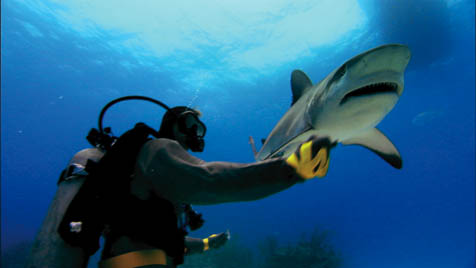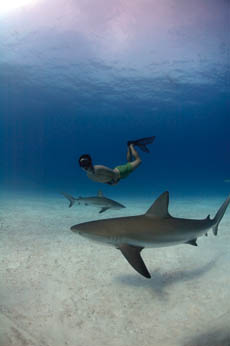Sharkwater
Showing at the Ocean Film Fest, Dispels Misconceptions about Sharks

Sharks are the last dragons, the last dinosaurs,” raves wildlife photographer, conservationist, and now filmmaker Rob Stewart. The species is often viewed as a monster, but in reality, sharks play an integral role in our oceans’ ecosystems-and they play the leading role in Sharkwater, Stewart’s first documentary feature. Since the film’s initial release in Canada, it has been playing the circuit of film festivals worldwide, garnering acclaim and collecting awards. Santa Barbara audiences are about to catch their first glimpse underwater into the increasingly endangered sharks’ predicament when Sharkwater plays at the Ocean Film Festival this weekend before opening everywhere else on November 2.
On a mission even greater than the average passionate filmmaker, Stewart wants to change the way we view sharks and their place in the world beneath the waves. On- and off-screen, his work is dedicated to education. Jaws did sharks a disservice, according to Stewart, and he’s about to change the score. While sharks are powerful and can sometimes be dangerous, this film shows Stewart swimming peacefully with the sleek fish. “In reality, sharks don’t eat people,” explained the fearless Stewart. “They make a few mistakes every year.”
While these mistakes may be well-publicized, less well known is the enormous shark fin trade and the destructive fishing practices that fuel it, including illegally set longlines that run through 60 or more miles of open ocean. Once caught, the sharks’ fins are chopped off, and then the flopping bodies are tossed back into the sea. More than 100 million sharks are killed this way for their fins each year to fill the demand for high-priced bowls of shark fin soup, considered by Asian cultures to have special benefits. These fishing techniques are rapidly decimating shark populations, even in what Stewart identified as the most protected areas of the planet. Why should we care? For 400 million years, reminded Stewart, these predators have been an essential thread in the ocean’s food and ecological web. Once gone, the fragile ocean ecosystems could collapse.

The fact that this industry exists, in spite of conservation efforts and even international laws, changed the very nature of the film Stewart initially set out to create. Years of traveling around the world as a wildlife photographer and self-proclaimed shark nerd led to his first film experience underwater. Near Ecuador’s Galapagos Islands, he set out to film hammerhead sharks in all their underwater splendor, but then encountered the illegal longlines. As he continued filming, Stewart partnered with the controversial and infamous Paul Watson, who runs the Sea Shepherd Conservation Society. Watson’s group takes to the seas in their own ships in search of illegal fishermen, going even where governments don’t tread. “He pushes the boundaries of nonviolence,” said Stewart.
Watson’s work became a major focus of Sharkwater as filming sharks in their natural habitat became a life-risking documentation of illegal destruction. The crew had to wrap the boat in barbed wire to keep from being boarded, were charged with attempted murder while filming Taiwanese mafia-backed finning operations, and had to hightail it across international borders out of the Costa Rican navy’s reach. Stewart turned the camera from the sharks to the people as the underwater drama became a high-stakes human one. His own life was even on the line, and he filmed from a hospital bed where he was fighting an infestation of flesh-eating bacteria.
While the film includes its fair share of human drama, suspense, and gory shark fishing scenes, the beauty of the sharks in their natural, ancient habitat is captivating. The astonishing imagery is only better because Sharkwater “is one of the first underwater films shot in high definition,” said Stewart.
Inevitably, the process of creating an underwater film involves some time underground. “Normally, I was editing in a dark basement, in a cement city in a cement block,” Stewart explained. He eventually found an editor in Santa Barbara, and the film was completed here. Being ocean-side rather than cement-side “was a totally different experience and much more holistic,” said Stewart. “We could actually go to the beach, and then go back and edit and actually be in and around the world I was talking about in the movie. That gave it a totally different perspective.”
The perspective on- and off-screen, in the theater and walking along the shore, has given Sharkwater life as a catalyst in the ocean conservation movement, particularly by making sharks a literal poster child for preservation. Stewart muses that he receives reams of letters from schoolchildren wanting to join conservation efforts. The film’s Web site (sharkwater.com) includes pages of educational material outlining statistics surrounding illegal shark fishing, provides information on conservation efforts worldwide, and links readers to biographies of the scientists and activists featured in the film. If Stewart has his way, we’ll never view a vertical fin in quite the same way again.
4•1•1
Sharkwater screens on Friday, October 19, at 7:30 p.m. at the Arlington Theatre as part of the S.B. Ocean Film Festival. See sharkwater.com and sboceanfilmfestival.com for more.



